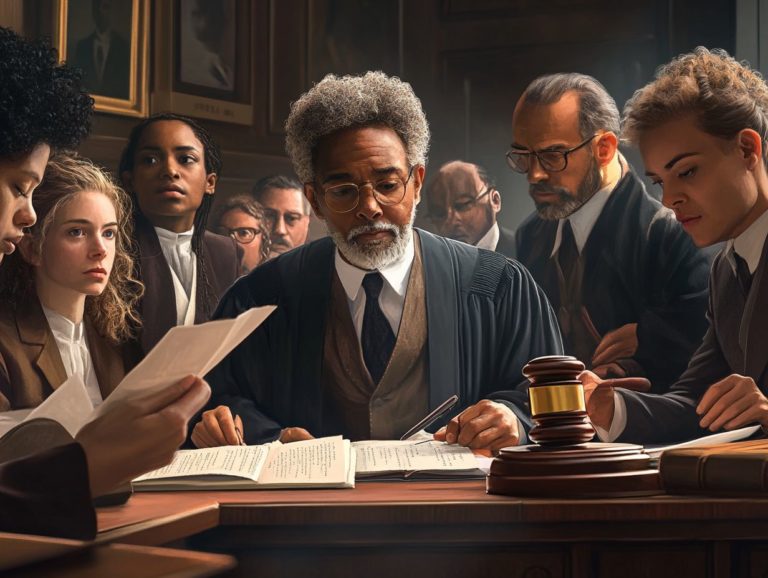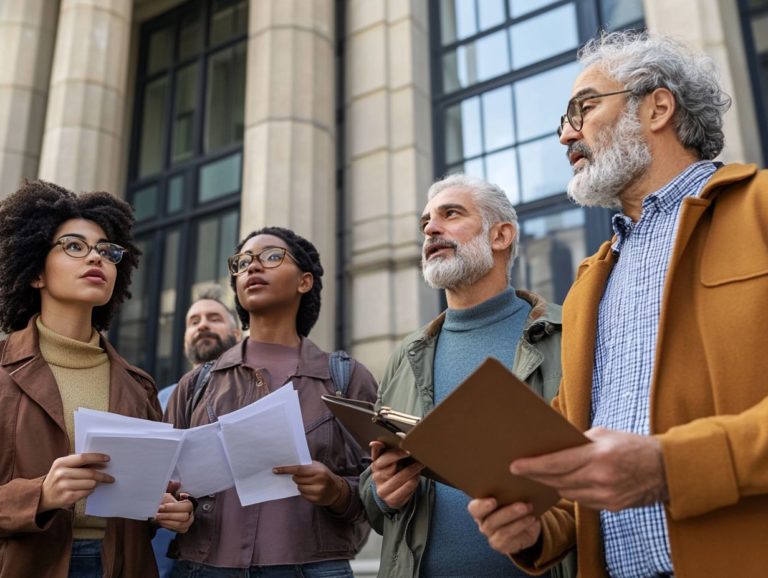What Are the Rights of the Accused?
The rights of the accused are fundamental to ensuring justice and fairness within the legal system. Understanding what these rights entail is crucial for anyone navigating a criminal charge.
From the moment you face arrest to the complexities of post-conviction scenarios, these rights serve as your safeguard against potential abuses and ensure you receive fair treatment under the law.
Let’s explore the vital rights that protect you if you’re accused of a crime. This article examines constitutional guarantees, protections during arrest and trial, and the processes that follow a conviction.
Dive in as we unravel these essential concepts and underscore their significance in preserving a just society.
Contents
Key Takeaways:
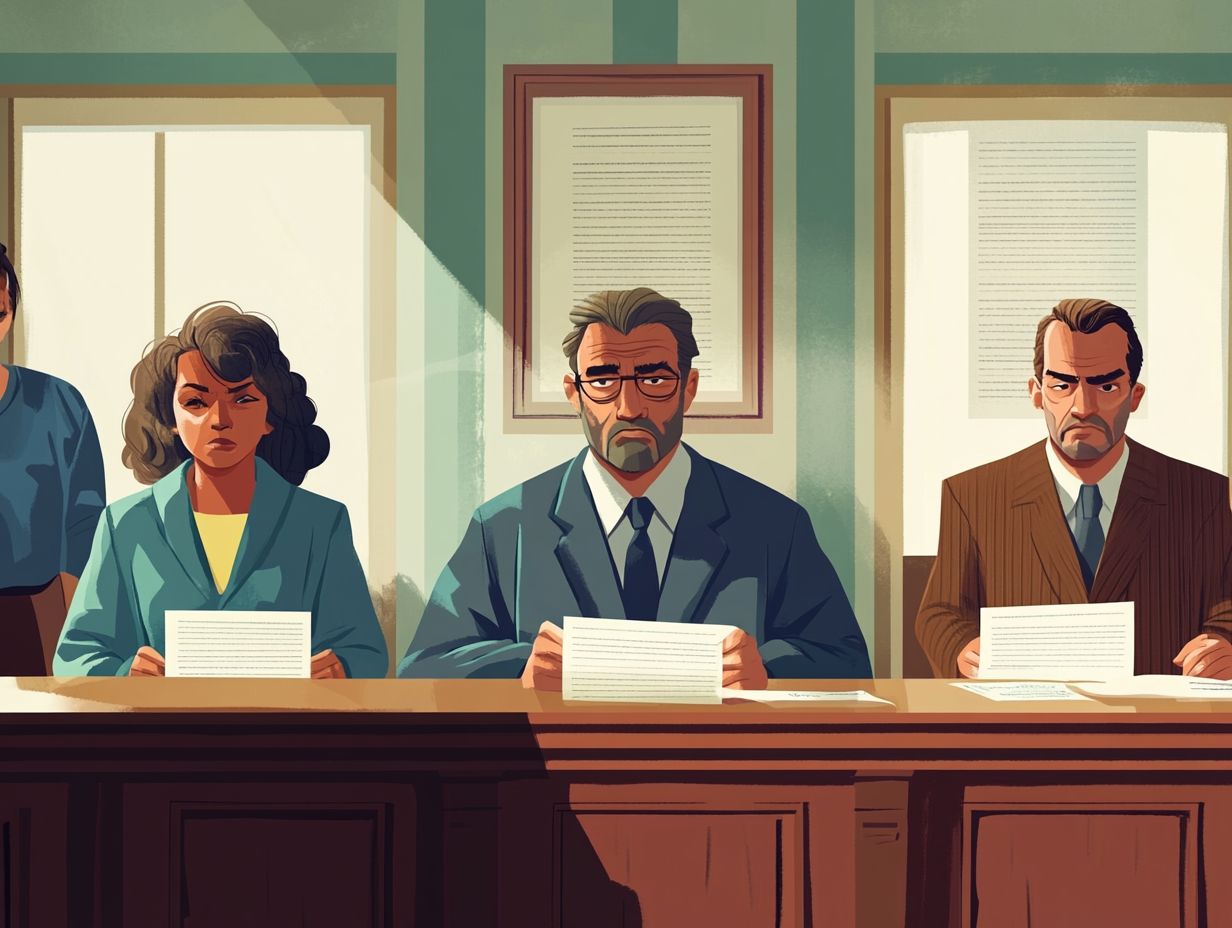
The rights of the accused are guaranteed by the U.S. Constitution and protect individuals from unfair treatment during the criminal justice process. These rights include the presumption of innocence, due process, and a fair trial, as well as protections against self-incrimination and unlawful searches and seizures. However, there are limitations and exceptions to these rights, and it is important for individuals to understand and exercise their rights to ensure a fair and just outcome.
Understanding the Rights of the Accused
Understanding the rights of the accused is essential for upholding the integrity of the legal system and ensuring that everyone facing criminal prosecution receives their fundamental rights.
These rights are designed to protect people from wrongful convictions, guarantee a fair trial, and ensure access to legal representation, thereby safeguarding the principles of due process embedded in the U.S. Constitution, especially under Amendment VI.
This comprehensive overview will explore the vital legal rights granted to individuals accused of serious crimes, highlighting the significance of effective legal representation and how these rights affect the criminal justice system.
What do the Rights of the Accused Mean?
The rights of the accused encompass a range of legal protections to ensure you receive fair treatment within the judicial system.
Among these protections is your right to a speedy trial, which shields you from the burden of prolonged incarceration without resolution. Access to information is equally vital, enabling you to grasp the charges and evidence against you.
This transparency not only supports your ability to mount a fair defense but also bolsters public confidence in the judicial process. Having a lawyer is also an essential right. This ensures you have someone to advocate for you.
Collectively, these rights lay the groundwork for justice, promoting equity and safeguarding against any misuse of power.
Constitutional Rights of the Accused
The constitutional rights of the accused serve as the cornerstone of legal protections in the United States, shielding individuals from potential abuses within the criminal justice system.
Enshrined in the U.S. Constitution, particularly within the Fifth, Sixth, Fourth, and Eighth Amendments, these rights guarantee that the accused have essential legal protections at their disposal. This includes the right to a fair trial, protection against double jeopardy, and the right to counsel.
Grasping the significance of these amendments and their implications is crucial for recognizing the rights afforded to defendants in criminal cases.
Overview of the Bill of Rights
The Bill of Rights, consisting of the first ten amendments to the U.S. Constitution, is pivotal for establishing your fundamental rights as an accused individual. These amendments stand as a crucial safeguard, ensuring you are treated fairly within the justice system.
Notably, the Fifth Amendment protects you against self-incrimination and double jeopardy while guaranteeing your right to due process an essential element for maintaining justice. Similarly, the Sixth Amendment assures you the right to a speedy trial, an impartial jury, and legal counsel, reinforcing the principle that you deserve a fair hearing.
Together, these amendments not only outline specific rights but also embody a profound commitment to preventing governmental abuse, thereby upholding the spirit of democracy and human dignity.
Rights During Arrest and Interrogation
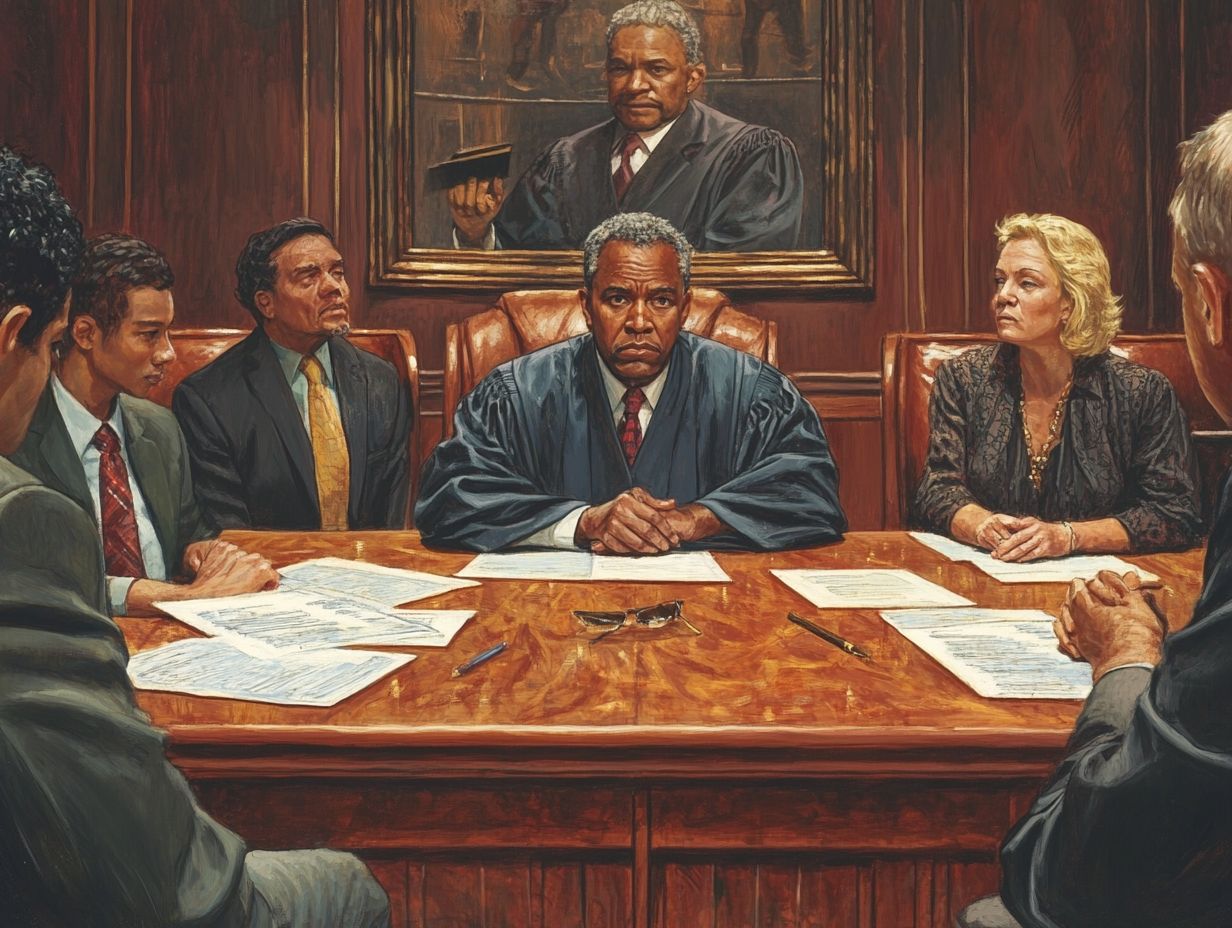
Rights during arrest and interrogation are vital safeguards. They protect you from unlawful detention and coercive interrogation tactics. These rights are rooted in the Fourth Amendment, which guards against unreasonable searches and seizures. This ensures that you are informed of your rights when taken into custody.
A key aspect of this is the Miranda warning. This warning clearly outlines your rights, including the right to remain silent and the right to seek legal assistance. This information is essential for ensuring fair treatment throughout criminal proceedings.
Miranda Rights and Protections
Miranda rights, established by the landmark case Miranda v. Arizona, inform you of your rights during police interrogations.
These rights emerged from the U.S. Supreme Court’s 1966 decision, highlighting the importance of the Fifth Amendment’s protection against self-incrimination. When in custody, you must be informed of your rights to remain silent and have legal counsel present.
This ruling was transformative. It ensures that you are aware of your options and the consequences of waiving those rights. The significance of Miranda rights extends beyond their legal framework; they play a vital role in upholding a fair justice system.
They ensure that confessions are not coerced and protect your dignity as an accused individual.
Rights During Trial
Your rights during a trial are crucial. They ensure you receive fair treatment in the U.S. legal system.
Presumption of Innocence and Due Process
The presumption of innocence is a cornerstone of the legal system. It secures the rights of the accused and emphasizes the principle of fair treatment through the normal judicial system.
This principle means you are considered innocent until proven guilty. It protects you from wrongful convictions.
By placing the burden of proof on the prosecution, this principle defends your dignity and reinforces the integrity of the judicial process.
Upholding this key tenet fosters public trust in legal proceedings. It reflects society’s commitment to fairness and justice.
Maintaining the presumption of innocence creates a balanced environment. It encourages all parties to present their cases free from bias.
Right to a Fair Trial
The right to a fair trial is a fundamental legal entitlement. It guarantees you receive a just and impartial hearing.
This principle includes the presence of unbiased juries, which are crucial for maintaining the integrity of the judicial process.
An impartial jury reflects community standards and plays a vital role in reaching a verdict based solely on the evidence presented. Public trials act as a safeguard against arbitrary rulings, fostering transparency and accountability within the legal system.
These elements connect to fair treatment in court, giving everyone a chance to present their case. This collective framework upholds the values of justice and fairness critical in any democratic society.
Rights After Conviction
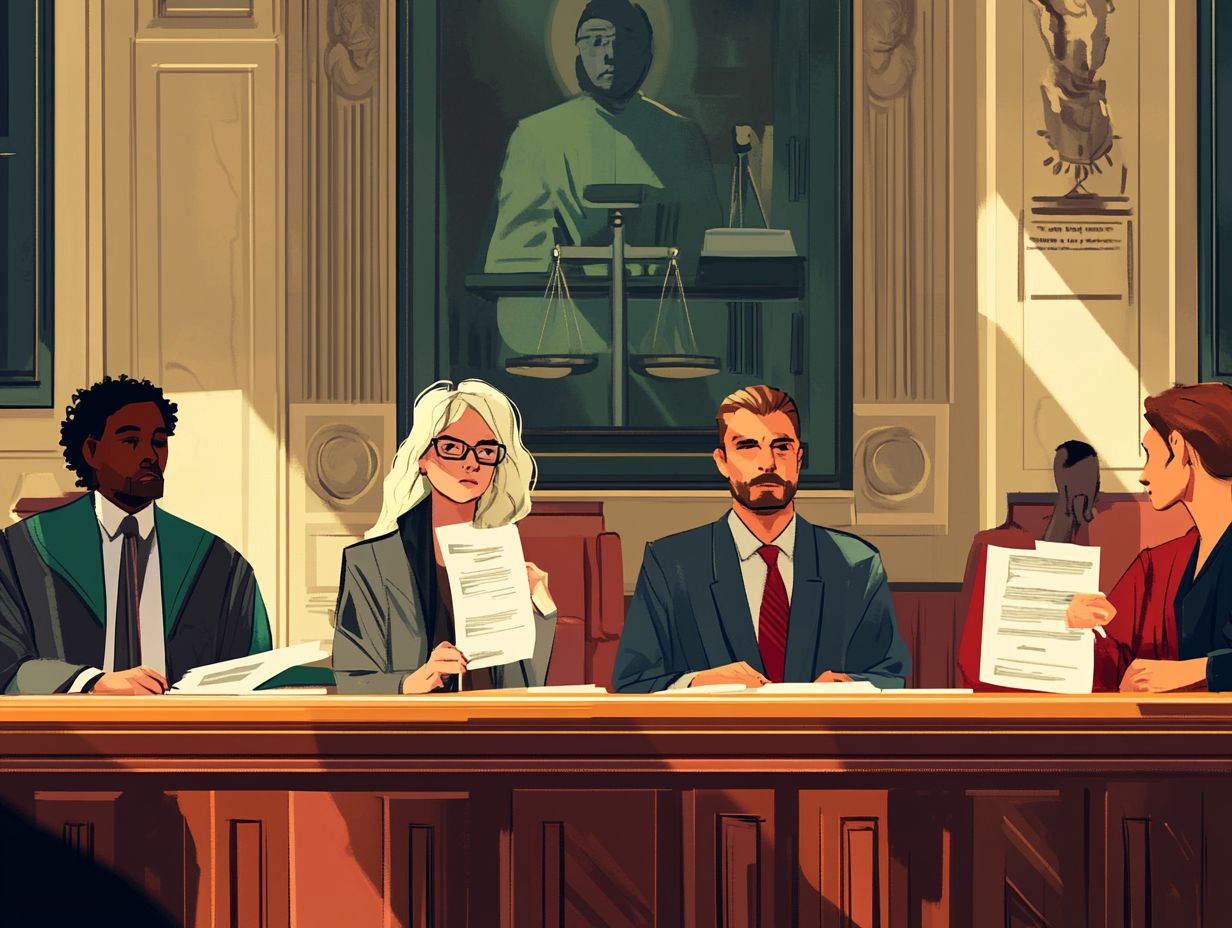
Your rights after a conviction are vital. They help you seek justice and address any issues after a verdict.
Appeals and Post-Conviction Relief
The processes of appeals and post-conviction relief are essential for protecting your rights as an accused individual, giving you the power to challenge wrongful convictions and pursue justice. These court options not only give you a second chance if you’ve been wrongfully convicted but also serve to uphold the integrity of the legal system.
Take, for example, the appeal process. It allows a higher court to scrutinize the decisions from your trial, focusing on legal errors that may have influenced the outcome.
Post-conviction relief includes options such as motions for a new trial, habeas corpus petitions (a legal action that allows a person to challenge their detention), and claims of ineffective assistance of counsel.
By enabling these proceedings, the judicial system reinforces the principles of due process, underscoring that every accused individual deserves a fair opportunity to challenge their conviction and seek true justice.
Limitations on the Rights of the Accused
While you may find that the rights of the accused are quite extensive, it’s important to recognize that certain limitations and exceptions can be imposed.
Exceptions and restrictions to the rights of the accused can emerge in specific legal contexts, ultimately impacting the due process you are afforded. This is particularly evident in cases involving terrorism-related investigations, where national security concerns may require the limitation of certain rights, such as your right to a speedy trial or access to unrestricted legal representation.
In emergencies, authorities may restrict rights. Such measures often spark contention and prompt important questions about the balance between protecting society and preserving individual liberties.
In these intricate scenarios, legal entities and law enforcement agencies must tread carefully along the fine line between effective crime prevention and upholding the fundamental principles of justice that are the foundation of a democratic society.
Frequently Asked Questions
What Are the Rights of the Accused?
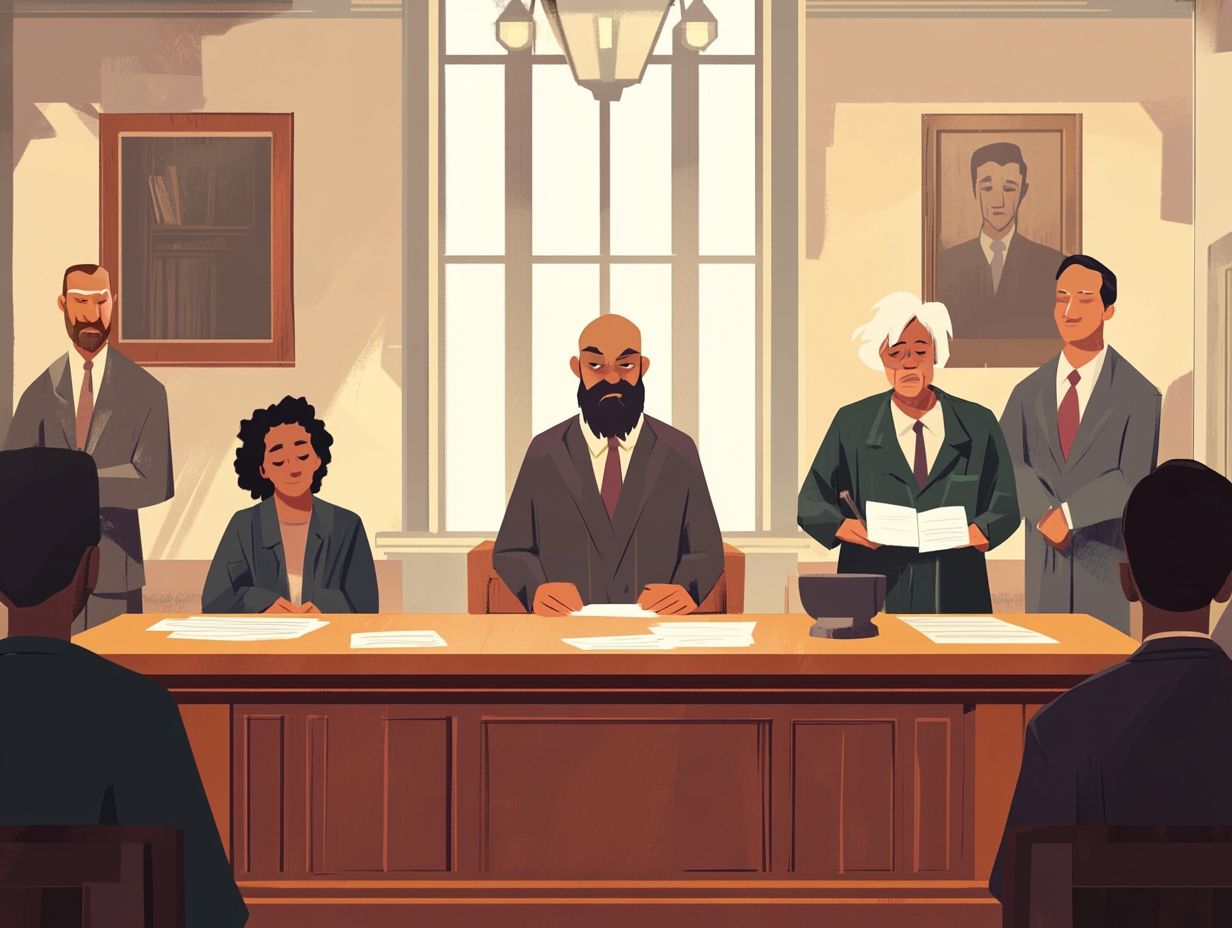
The rights of the accused refer to the legal protections and entitlements granted to individuals who have been accused of committing a crime.
What is the purpose of the rights of the accused?
The purpose of these rights is to ensure that individuals who are accused of a crime are treated fairly and have a fair trial, regardless of the severity of the crime.
What are some examples of rights of the accused?
Examples include the right to remain silent, the right to an attorney, the right to a fair and speedy trial, and the right to be presumed innocent until proven guilty.
Can the rights of the accused be waived?
Yes, the rights can be waived, but only if the individual does so voluntarily and with a full understanding of the consequences.
What happens if the rights of the accused are violated?
If the rights are violated, it can result in the case being dismissed or a mistrial. In some cases, it can also lead to legal consequences for those responsible for the violation.
Do the rights of the accused apply to all criminal cases?
Yes, the rights apply to all criminal cases, regardless of the severity of the crime or the individual’s background. These rights are a fundamental aspect of the justice system, ensuring fairness for all individuals accused of a crime.


